https://edition.cnn.com/2018/11/04/media/germany-der-spiegel-trump-midterms-intl/index.html
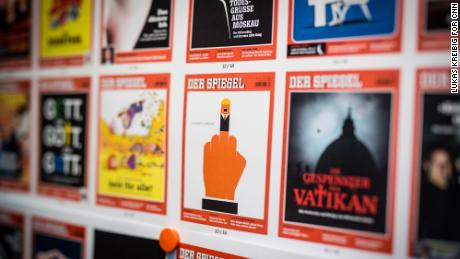
Der Spiegel covers are displayed on the wall of the magazine's headquarters in Hamburg, Germany.
Trump's been president for two years. Germans still can't look away
Updated 0602 GMT (1402 HKT) November 4, 2018
Hamburg, Germany (CNN Business)Over two floors of Der Spiegel's glasshouse building, walls bearing seven decades of the magazine's covers serve as a colorful chronology of modern history. On one wall are cartoons of an angry yellow-haired man that are so provocative they're impossible to miss.
US President Donald Trump is, on one cover, depicted as an ape-like species in the March of Progress. The well-known image, usually used to show the theory of human evolution, is reversed with Trump last in line, his back hunched and hands hanging by his knees.
Another depicts the president as a screaming finger puppet on a hand giving the middle finger next to the words "Goodbye, Europe!," published as Trump clashed with European leaders over his decision to pull out of the Iran nuclear deal.
A series of Trump covers drawn by Cuban-American artist Edel Rodriguez for Der Spiegel has gone viral and given the weekly magazine's profile a boost beyond its European base.
The daily drama of the Trump administration has triggered a surge of news consumption in the United States, but European media like Der Spiegel are experiencing a "Trump bump" as well.
"It's been a 24/7 news cycle regarding Trump. He is dominating Twitter, he is dominating the news. And he has, of course, dominated our Spiegel Online news website," the magazine's deputy foreign editor, Mathieu von Rohr, told CNN
"Trump still clicks, people are interested in those stories — and the same applies to our magazine stories and covers."
At Der Spiegel headquarters in Hamburg on Monday, journalists were working out how to cover the breaking news that longtime German Chancellor Angela Merkel was standing down as party chair after 18 years and would not seek re-election in 2021.
It is likely to be Germany's biggest political news story of the year, but on the foreign desk, von Rohr was looking to the US midterms elections next week.
Der Spiegel is beefing up its staffing to support its six full-time correspondents in the United States for the vote. That wasn't considered during previous midterms, a biennial event in which Americans elect a new House of Representatives, as well as some senators and governors.
But these midterms are different. The elections are seen as a referendum on Trump that could strengthen or weaken his vision for a new world order.
Germans love to hate Trump
The midterms are also a reminder that the president has been in power for nearly two years, and while interest in Trump spiked in Europe around his election, it has remained robust across the continent.
Unlike in the United States, where Trump is a divisive figure, Germans overwhelmingly disapprove of the US president.
The Pew Center for Research's spring survey on global attitudes found a dramatic drop in confidence that Trump would do the right thing for the world in most European countries, when compared with Barack Obama.
At the end of Obama's presidency, Germany's confidence in the US president was 86%. Now German confidence in Trump is 10%. France went from 84% in Obama's final months to 9% now, while the United Kingdom dipped from 79% to 28%.
Yet the volume of online searches for Trump in the same countries is huge, according to data from analytics company SimilarWeb, which shows that Trump was by far the most searched-for person in the world over the past 12 months.
In the United Kingdom, more people searched for the American President than their own prime minister, Theresa May, or even Brexit, Google Trends data shows.
Back in Germany, Trump was also more searched for than Merkel over the past year, according to SimilarWeb. This combination of disapproval and enormous interest in the president suggests an interesting dynamic — Germans love to hate Trump.
He has been the lead story in Der Spiegel many times. In one of the magazine's May editions -— with the cover of Trump as a middle finger — Der Spiegel devoted 16 pages to Trump stories, mostly related to the Iran deal. The landmark agreement was brokered by the Obama administration and European leaders, who took Trump's announcement as an affront.
Der Spiegel's deputy chief editor, Susanne Beyer, makes no apologies for the magazine's attention to Trump, nor its unflattering cartoons.
She defended Der Spiegel's most controversial cover, which depicted Trump wielding a knife and holding the bleeding head of the Statue of Liberty, as if he had just decapitated the powerful symbol of American freedom.
That image, next to the words "America First," was published in February 2017 as Trump signed an executive order that barred people from seven Muslim-majority nations from entering the United States.
Several politicians and newspapers in Germany criticized the cartoon as tasteless and violent.
"We stand by that cover. It's tough, but we believe that one has to be tough against Trump," Beyer said from her office, which looks out on the regenerated port area of Hamburg.
"That cover was done at the time after the Muslim ban and it is such an outrage to prevent people from entering the freest country in the world, ultimately because of their religion. So we thought, 'as tough as possible, as clear as possible.' After all, that is the language he speaks."
A media 'obsession' with Trump
Trump's travel ban and that cover seem like a lifetime ago, and a dizzying number of political developments have unfolded since. An investigation into the Trump campaign team's possible ties to Russia has produced indictments of former Trump campaign advisers.
Several senior White House officials have lost their jobs or quit. Adult film star Stormy Daniels publicly announced in 2018 that she had an affair with Trump in 2006 and was paid off by his lawyer to keep quiet before the 2016 election.
There are plenty more chapters to the Trump saga that haven't closed — and the foreign media are covering them all.
Roland Schatz, founder and CEO of the Zurich-based analytics company Media Tenor International, points to the media's "obsession" with the Trump story as part of the reason for his rise and his continued prominence, even in Europe.
His company analyzed coverage from 100 global media organizations reporting on this year's World Economic Forum in Davos, and found that Trump received 15,000 of the nearly 76,000 mentions of people in relation to the conference.
In second place was the forum's chairman, Klaus Schwab, with just 1,900. He was followed by French President Emmanuel Macron, Merkel and Indian Prime Minister Narendra Modi.
"Trump got almost all the visibility, and that was at the expense of a lot of great leaders," said Schatz. "No one believed someone like Trump would win [the US election], and his actions now continue to give him a lot of visibility in the media."
For Rodriguez, the artist behind Der Spiegel's provocative cartoons, his work on Trump is no obsession. He says he will continue to satirize the president until "he is no longer a danger" to the country.
''There is nothing I like drawing about him. If he disappears tomorrow I would go back to drawing other things," he said.
He explained he was inspired to draw the cartoon of Trump decapitating the Statue of Liberty because the president had destroyed his personal American dream. He went to the United States as a boy on a boat fleeing Cuba, and the statue represented a land that welcomed outsiders.
''I don't think the US is the same in the world's eyes anymore to what we used to be. That is the saddest part of the Trump administration and how he kind of destroyed that. That's what I wanted to show — him cutting off the head of a dream.''
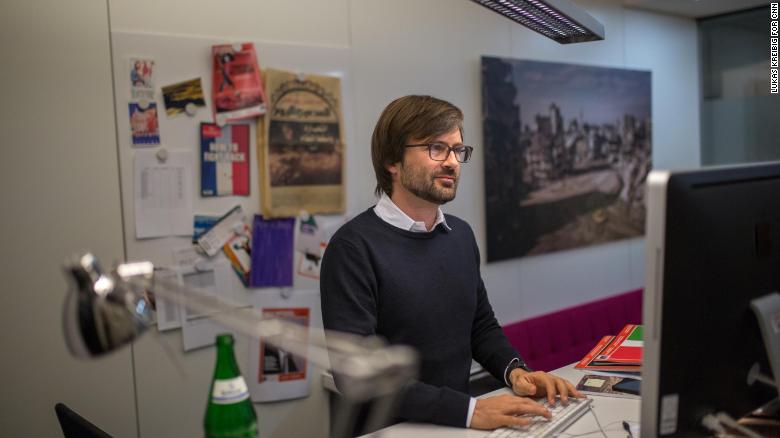
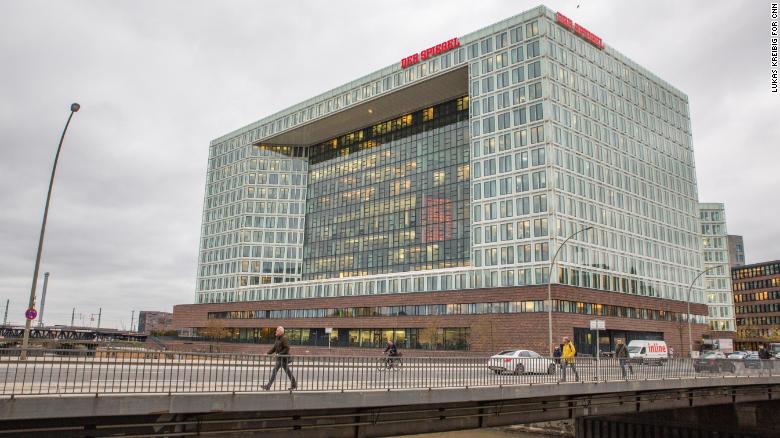
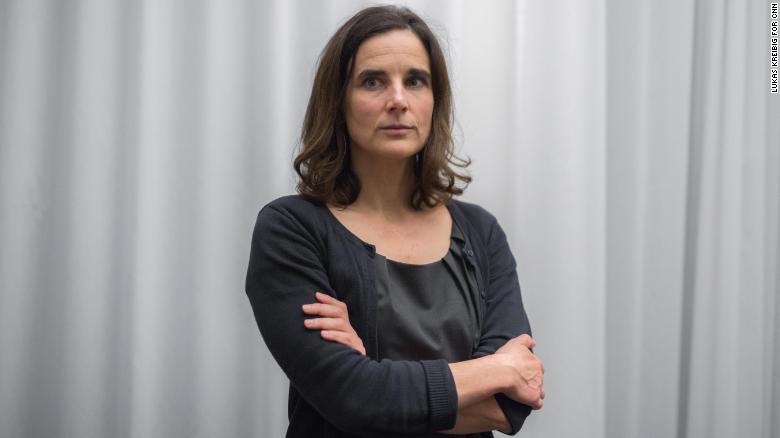
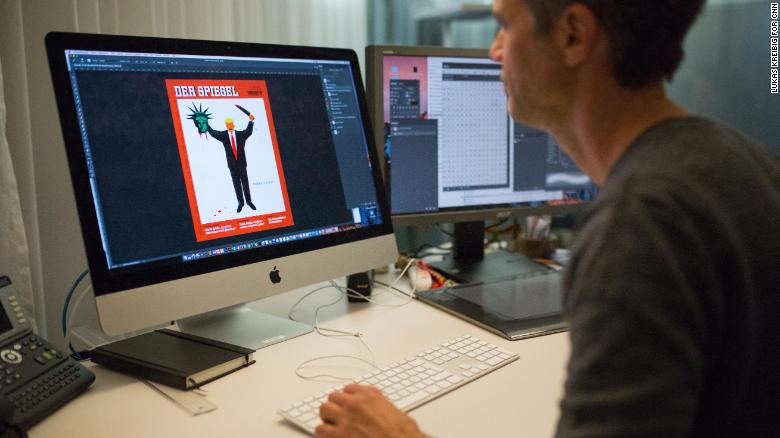
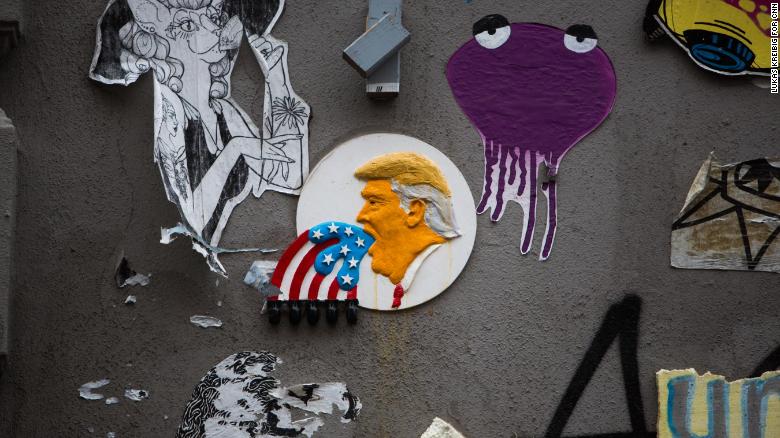



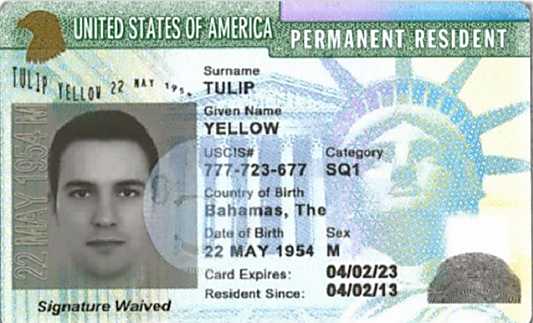

沒有留言:
張貼留言